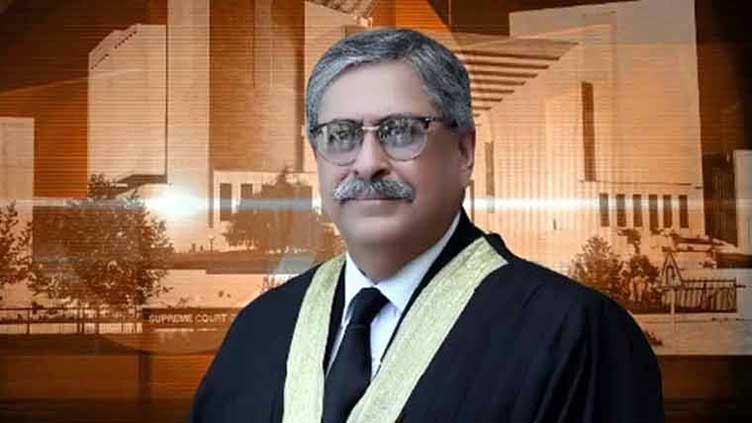Justice Minallah asks ECP if it gave level playing field to PTI

Pakistan
In a four-page note, he asked the ECP to satisfy the court that the PTI was excluded legitimately
ISLAMABAD (Dunya News) – Justice Athar Minallah on Saturday observed that the case of reserved seats for the Sunni Ittehad Council (SIC) is not only about the seats but also about the basic constitutional rights of the real stakeholders i.e. the people of Pakistan.
Justice Minallah, who is a member of the full court bench hearing SIC’s appeal for reserved seats women and minorities, in his additional note asked the Election Commission of Pakistan (ECP) to satisfy the Supreme Court that the Pakistan Tehreek-i-Insaf (PTI) was excluded from the electoral process legitimately, thereby forfeiting its claim to reserved seats.
The justice directed the ECP to satisfy the apex court that a level playing field was provided to all political parties, including the PTI, before, during, and after the February 8 general elections.
The SC will resume hearing the appeal on Monday.
In a four-page note, Justice Minallah observed that petitions pending before the court raising questions about the integrity of the Feb 8 polls should be heard alongside the SIC petitions. He directed the ECP to place on record the nature of complaints received before, during, and after the elections and satisfy the apex court that each political party was treated in accordance with the Constitution.
Justice Minallah observed that the question of reserved seats could not be decided in isolation or based on technicalities and pleadings. “The larger issue involves the fundamental democratic and constitutional right of the real stakeholders — the voters.
“As they are not before the bench and as the highest court vested with jurisdictions under articles 184(3) and 187 of the Constitution, the approach ought to be inquisitorial.”
The judge wrote that the Supreme Court was the custodian of the rights of the people and the right to vote was one of the most important fundamental rights.
“All other rights become illusory and the Constitution is gravely violated when voters are disenfranchised, if the ECP fails in its duty to conduct the elections in accordance with the mandate of the Constitution,” observed Justice Minallah.
The Constitution has vested the exclusive extraordinary jurisdiction under Article 184(3) in addition to doing complete justice in the exercise of the duty conferred under Article 187, he wrote, adding that the apex court could not be a slave to technicalities in a matter of such public importance that affects every citizen and the future of the country.
“As petitions were pending before the SC challenging the integrity of the electoral process during the general elections and the alleged violation of the fundamental rights of voters and political workers, the court could not turn a blind eye by ignoring such matter,” he noted.
The judge observed that it (SC) must not be perceived as being complicit in the alleged failures of the ECP to conduct credible elections as mandated under the Constitution.
It was the onerous duty of the SC to ensure that no voter was disenfranchised and questions regarding the integrity of the electoral process were not ignored, he said. But, he added, the arguments advanced by the ECP’s counsel had raised grave questions regarding the integrity of the electoral process.
The exclusion of a major political party from the general elections by the ECP, on the basis of its flawed interpretation of a Supreme Court judgement [on January 13, 2024], definitely had the consequence of the disenfranchisement of voters and thus deprivation of the reserved seats.
The legitimacy of governance, future policies, legislation, and public trust in representative institutions depend on the integrity of the electoral process and institutions. The ECP’s alleged failure to discharge this duty would raise questions about fulfilling their constitutional obligation to conduct elections.
‘ECP FAVOURED BAP IN 2019’
Meanwhile, the SIC submitted that the ECP had in 2019 allocated reserved seats to the Balochistan Awami Party (BAP) even though it had not contested election from Khyber Pakhtunkhwa nor submitted a list of candidates for reserved seats for women.
It argued that the ECP applied different standards in allocating reserved seats to BAP in the KP Assembly in 2019, but took a discriminatory step by refusing to allocate reserved seats to the SIC.
The application requested the KP government be allowed to furnish additional documents in the case.


